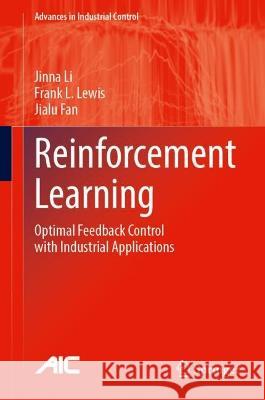Reinforcement Learning: Optimal Feedback Control with Industrial Applications » książka
Reinforcement Learning: Optimal Feedback Control with Industrial Applications
ISBN-13: 9783031283932 / Angielski
Reinforcement Learning: Optimal Feedback Control with Industrial Applications
ISBN-13: 9783031283932 / Angielski
(netto: 536,72 VAT: 5%)
Najniższa cena z 30 dni: 539,74
ok. 16-18 dni roboczych.
Darmowa dostawa!
This book offers a thorough introduction to the basics and scientific and technological innovations involved in the modern study of reinforcement-learning-based feedback control. The authors address a wide variety of systems including work on nonlinear, networked, multi-agent and multi-player systems.A concise description of classical reinforcement learning (RL), the basics of optimal control with dynamic programming and network control architectures, and a brief introduction to typical algorithms build the foundation for the remainder of the book. Extensive research on data-driven robust control for nonlinear systems with unknown dynamics and multi-player systems follows. Data-driven optimal control of networked single- and multi-player systems leads readers into the development of novel RL algorithms with increased learning efficiency. The book concludes with a treatment of how these RL algorithms can achieve optimal synchronization policies for multi-agent systems with unknown model parameters and how game RL can solve problems of optimal operation in various process industries. Illustrative numerical examples and complex process control applications emphasize the realistic usefulness of the algorithms discussed.The combination of practical algorithms, theoretical analysis and comprehensive examples presented inReinforcement Learningwill interest researchers and practitioners studying or using optimal and adaptive control, machine learning, artificial intelligence, and operations research, whether advancing the theory or applying it in mineral-process, chemical-process, power-supply or other industries.
This book offers a thorough introduction to the basics and scientific and technological innovations involved in the modern study of reinforcement-learning-based feedback control. The authors address a wide variety of systems including work on nonlinear, networked, multi-agent and multi-player systems. A concise description of classical reinforcement learning (RL), the basics of optimal control with dynamic programming and network control architectures, and a brief introduction to typical algorithms build the foundation for the remainder of the book. Extensive research on data-driven robust control for nonlinear systems with unknown dynamics and multi-player systems follows. Data-driven optimal control of networked single- and multi-player systems leads readers into the development of novel RL algorithms with increased learning efficiency. The book concludes with a treatment of how these RL algorithms can achieve optimal synchronization policies for multi-agent systems with unknown model parameters and how game RL can solve problems of optimal operation in various process industries. Illustrative numerical examples and complex process control applications emphasize the realistic usefulness of the algorithms discussed. The combination of practical algorithms, theoretical analysis and comprehensive examples presented in Reinforcement Learning will interest researchers and practitioners studying or using optimal and adaptive control, machine learning, artificial intelligence, and operations research, whether advancing the theory or applying it in mineral-process, chemical-process, power-supply or other industries.











